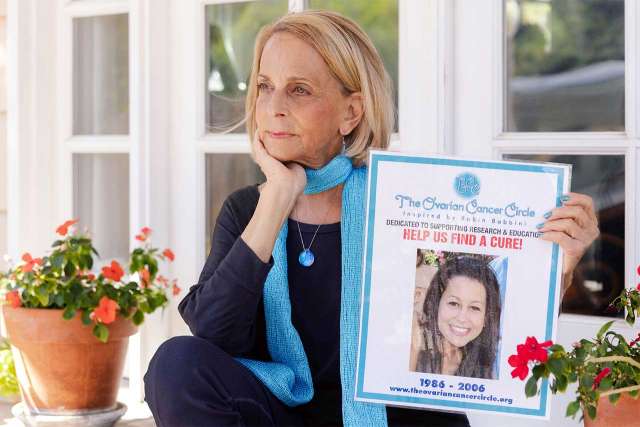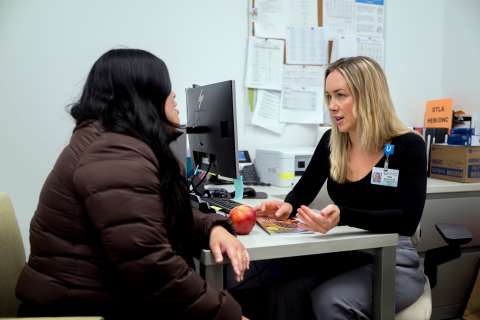For the love of Robin
Paulinda Schimmel Babbini’s nails are always painted a vivid teal. Teal is the official color of ovarian cancer awareness, and Babbini is committed to spreading the word. The color draws attention, and the moment someone remarks on her nails, she takes the opportunity to tell them about her daughter, Robin, who died of ovarian cancer in 2006, when she was just 20 years old.
Babbini has made it her mission to educate women and girls of all ages about ovarian cancer, which is among the leading causes of cancer-related death among women, according to the American Cancer Society. “People just don’t know enough about this cancer,” she says, “especially because its symptoms are so elusive.”
In the four years after Robin’s death, Babbini slowly emerged from her mourning to take a huge step outside of her comfort zone. Describing herself as a private woman unaccustomed to public speaking, Babbini, with the help of a small group of volunteers, launched her nonprofit, The Ovarian Cancer Circle/Inspired by Robin Babbini, in 2010. Since its inception, The Circle, as many know it, has raised and donated more than $1 million to support gynecologic oncology research at UCLA Health.
“Either I could have crawled into a cave and become the most depressed person imaginable, or I could take a new path and move beyond my loss, turning grief into something positive and productive,” Babbini says. “The Circle is a vigorous, positive outlet to do good. It has saved me, and it will, I hope, save many, many lives.”
Robin was in high school when she started to complain about nausea, back pain and indigestion. Nonetheless, the spirited teenager kept up her fast-paced life as a cheerleader, editor of the school newspaper and member of the drama club.
When the pain didn’t subside, Babbini took her daughter to see a gynecologist. But he didn’t connect a high-school-age girl with the potential of a gynecologic cancer and failed to ask the right questions, she says. “He really misunderstood it all and, sadly, shrugged it off.”
On her own, Robin began thumbing through a medical reference book they had at home. “Mom,” Babbini recalls her daughter saying to her, “I have ovarian cancer.” “No!” Babbini responded. “You’re too young. You’re only 17.”
Within a few months, Robin’s pain was so severe, she went to the emergency room, where a CT scan revealed four large tumors. Robin would need surgery right away.
The diagnosis was stage 3 ovarian cancer, which had spread to her colon. Robin underwent a hysterectomy, colon resection and six rounds of chemotherapy. She recovered enough to graduate from high school and start her freshman year at UC Santa Barbara, where she pledged to the Kappa Kappa Gamma sorority.
But ovarian cancer has a high recurrence rate; for stage 3 disease, it is 80%, according to the American Cancer Institute.
Babbini prayed: “God, let us be on the side that it doesn’t recur.”
The cancer returned during her freshman year. Robin did her best to balance college life with frequent trips back to L.A. for tests, treatments and chemotherapy, Babbini says.
Still, the cancer advanced, and Robin succumbed to the disease that same year.
In the earliest days of the Ovarian Cancer Circle, Babbini was introduced to Sanaz Memarzadeh, MD (RES ’00, FEL ’03), PhD ’08, a gynecologic oncologist and researcher at UCLA Health. Babbini was impressed by a presentation Dr. Memarzadeh made during a conference, and she knew at that moment that she wanted to support her work.
For Dr. Memarzadeh, The Circle’s support transcends its annual donations. A 2020 study found that funding for ovarian cancer research is about 5% of the amount allocated for prostate cancer, though ovarian cancer is far more deadly. Researchers concluded that national funding for ovarian cancer research doesn’t correspond with the lethality of the disease.
“For underfunded diseases like gynecologic cancers, philanthropic support is essential,” Dr. Memarzadeh says. It allows her lab to conduct experiments with few restrictions, exploring novel, breakthrough ideas and generating preliminary data that can lead to subsequent support from larger agencies such as the National Institutes of Health.
But funding is only part of the partnership between the physician-scientist and The Circle. “Paulinda has created a community of women who are passionate about women’s-cancer research,” Dr. Memarzadeh says. “Some are survivors themselves; some are in treatment; some have lost loved ones to this cancer. The Circle has become an invaluable communications resource, tethering our research goals to increased public awareness.”
That has extended to engagement with such civic resources as the City of West Hollywood, the Los Angeles City Council and other women’s groups. “So, yes, the funding is important, but their work also brings heightened awareness to cancers that are understudied and triggers conversations about the signs and symptoms and the need for more research that leads to better treatments,” Dr. Memarzadeh says.
Dr. Memarzadeh is often the guest of honor at The Ovarian Cancer Circle’s fundraising events, where she presents the latest research being conducted in the G.O. [Gynecologic Oncology] Discovery Lab that she runs. “Sanaz communicates the science of her work so clearly, and with such inspiration, that our guests often walk out of there donating even more money than they’d planned,” Babbini says.
Every year since she founded the Circle, Babbini visits UC Santa Barbara to speak to the current members of Robin’s sorority. She encourages the young women to be vigilant about symptoms such as bloating, difficulty eating, nausea or pain in the pelvis or abdomen, and to seek screening with a gynecologic oncologist. “I can talk about Robin and with all my heart keep her memory bright, but I must educate these young women that ovarian cancer is not just an older woman’s disease — anybody can get it,” Babbini says.
Babbini also lobbies year-round with city officials to raise awareness. During national Ovarian Cancer Awareness Month in September, both L.A. City Hall and West Hollywood’s City Hall are lit up nightly in teal. The 11 LAX Gateway pylons have also glowed teal for ovarian cancer awareness.
It is estimated that ovarian cancer will take the lives of some 13,000 women in the United States in 2025. Babbini wants to save as many of those lives as she can. “The more women who learn about the symptoms, the more proactive they can be,” she says. “I often think that if I had known then what I know now, Robin would be here today.”
Helping save women from her daughter’s fate gives lasting purpose and meaning to Babbini’s life. Wherever she goes, Robin’s mother talks about ovarian cancer and hands out informational bookmarks, which include a smiling photograph of Robin.
And every day, Babbini looks at the candle that she lights in her home in memory of Robin. “She’s not here with me physically,” Babbini says, “but she’s here with me in spirit every single day. My motto forever will be, ‘No more Robin stories!’”
Sandy Cohen is a senior writer for UCLA Health Marketing Communications and a former national writer for The Associated Press.
For more information: The Ovarian Cancer Circle.
Related: Ovarian cancer hits 'below the belt.' This doctor is raising an army to stop it




